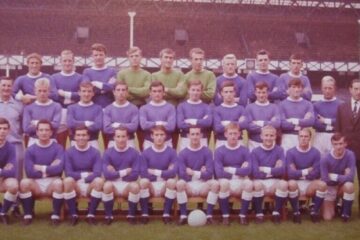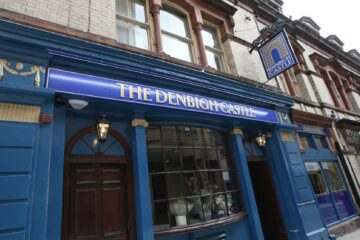Holmes Sweet Holmes
Albert Holmes
Albert Valentine Holmes was born on 14 February 1942, St. Valentine’s Day, hence the middle name Valentine. In his teens, Albert attracted attention for his football skills and was wanted by Rotherham United, but declined in order to prioritise his focus on his studies, which were more important to him.
He started work by taking on an apprenticeship with British Gas (East Midlands Gas) as a gas fitter. The works had a football team for which Albert played. He was also involved in local football and, at the age of sixteen, matched up against opponents much older than himself. It was the secretary of his gas board social club who knew someone who was fairly well-known in football who contacted the manager at Sheffield United, alerting him to come and take a look at young Albert.
True to his word, he came to watch him, which later led to the manager paying a visit to the local social club where he asked Albert to sign for the Blades. However, at the age of sixteen, Holmes was classed as a junior. If he had signed for Sheffield United but not been involved as a regular which was his desire, he could not have developed his ability and love of playing in local teams.
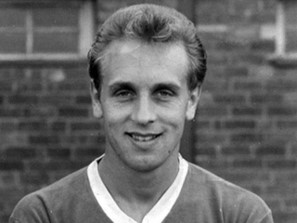
This restriction, combined with Albert’s hunger to be involved on a regular basis and determination to accept nothing less, meant that he ended up signing for Chesterfield manager Doug Livingstone on a part-time contract in 1961 after serving one year with the juniors. There were a number of part-time players at the club when he arrived, but Livingstone was already clearing the decks. Fortunately for Albert, he had made a positive impression and was retained.
“You weren’t allowed to sign on as an amateur back then.” Holmes told me. “You had two options, full or part time.”
Chesterfield was chaired by Harold Shentall, who was a member of the England selection committee, rubbing shoulders with some very influential people.
Blessed with excellent balance, Albert was consistent, hardworking and skilful, with sound positional play. He adopted a no-nonsense attitude to the game. Off the field, he was well known for his infectious sense of humour. He featured regularly for the second string, playing full back in what was known as the Central League – which was of a very high standard consisting of teams from the top two divisions. At that time, the Spireites were the only representative from the Fourth Division to compete in that league.
He had the privilege of playing at Anfield, Goodison Park, Old Trafford, Maine Road and all over the north of England which was a great football education. “We used to get hammered every week,” he told me, with the team lacking the quality possessed by the other teams that made up the league.
“We were a very young team. I was only eighteen or nineteen but, despite getting some hidings, we enjoyed the experience of playing against a high standard of teams in some very good stadiums.” he admitted. He continued,
“Don’t forget, the top division sides had a combined side of youngsters making their way into the game, plus having the benefit of playing alongside some of the senior professionals who were coming back from injury, building their fitness back up.”
He declared proudly; “We played at Goodison. They were the days when the club was managed by Harry Catterick. We won the game 1-0. We played our famous 1-10-0 plan. A goalkeeper, 10 defenders in the penalty box, and that was it,’ he said with joyful laughter. I do remember coming up against a winger called Tommy Ring who was a quality individual.”
The return game at Saltergate came three to four weeks later. Reminiscing again, Albert added, “I was talking to one or two of their lads about our victory weeks previously, and Catterick ordered Gordon Watson, who was in charge of the second-string team, to be detained in the dressing room for an hour for what I believe was an ear-bashing. Revenge was sweet for them as they gave us a drubbing back on our soil.”
“David Herd was another professional who I crossed paths with, whilst with Manchester United. He was a very experienced professional, having spent sixteen years in the top flight with Arsenal, Manchester United and Stoke City respectively.”
Albert’s performances were getting noticed and a break in the first team finally arrived in the fourth tier of English football. It was not, in fact, in the league where he made his bow. His debut came in an FA Cup replay in a midweek fixture at Boundary Park, Oldham in November 1961, where the Spireites were beaten 4-2. Albert’s league debut came away at Darlington on 7 April 1962. The Quakers (Darlington’s nickname) were leading 4-1, with ten minutes remaining, but a spirited fightback from Chesterfield saw them rally to find the net three times, coming away from Feethams with a creditable 4-4 draw!
His first goal came on New Year’s Day 1963 playing as a centre forward, as they faced a heavy defeat away at Barrow losing 5-2. That was the first of his ten goals for the club. Incidentally, his last goal came in another midweek fixture at Gigg Lane Bury in a 2-2 draw.
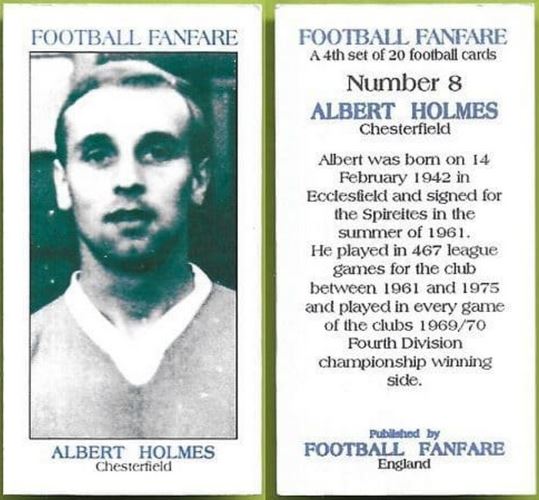
Albert described his time enthusiastically;
“We had a manager called Matt McShane who did well for us. He eventually departed then Jimmy McGuigan was appointed, who was a real task master. Playing on a Saturday was a rest for us compared to the training we did during the week! With the group of lads, we had our fun and a laugh, but once the training sessions began, it was serious business.”
“In all of my career, I am proud to say that I was never booked. In my day in the Divisions Three and Four, defenders had the reputation of being ‘cloggers’, and the only way to stop an attacker was by bringing him down.”
“I had pace about me, and was quite solid, so I had the ability to make a fair challenge on an opponent. I was on the receiving end a time or two of unfair treatment. I never ever showed the opponent that it bothered me. I would get up and smile.”
In 1969/70, Chesterfield were crowned Division Four champions, achieving promotion to the third tier with sixty-four points. They were three points to the good to runners up Wrexham, with Swansea City and Port Vale the two other sides making the group for promotion. This earned manager Jimmy McGuigan the manager of the year award.
Holmes was an ever-present part of that successful team which topped the league elevating them into the third tier of English football, which is a statistic he is very proud of when reminiscing about that season, which brought many a fan to pack the terraces of Saltergate. Albert proudly described their efforts: “We worked and trained hard and deserved promotion. The town and supporters were made proud of our achievements.”
The following season (1970/71) the Spireites were two points short of the fourth promotion place and successive promotions. It was Aston Villa who made the final promotion berth their own. That was as good as it got for the Derbyshire outfit.
In those days, Chesterfield and clubs in the Third and Fourth division would sign players on a free transfer, and the players would receive a signing-on fee.
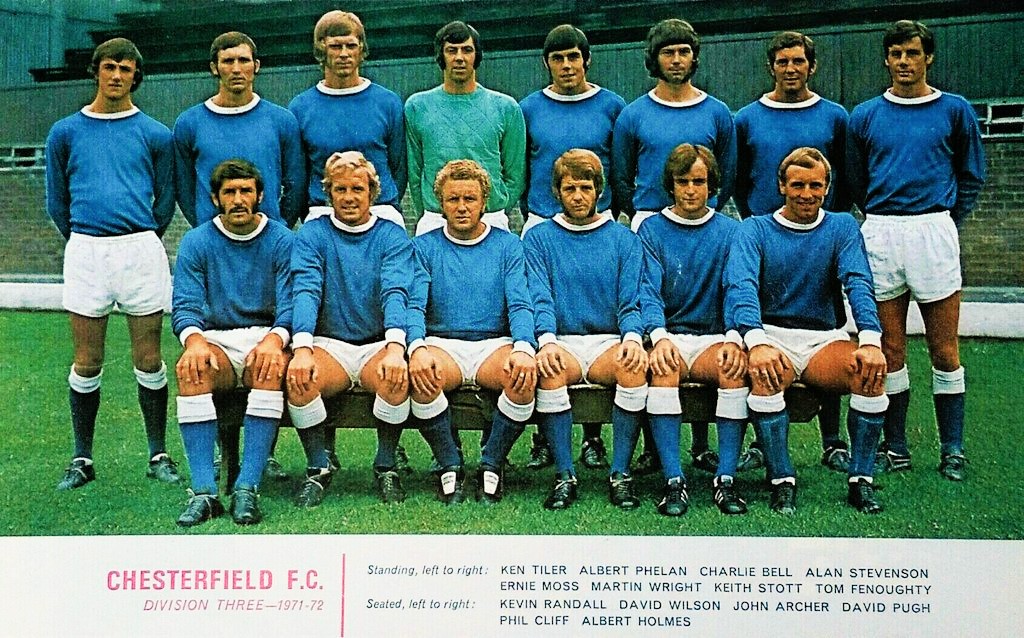
Albert Holmes front row, far right
Holmes was almost about to leave Chesterfield without any knowledge of an interested party. Albert’s experience reflected the situation for players at the time:
“I remember one Friday morning in training when I was called into the office to be told that Chesterfield had received an offer from Bury to sign me. They were in the Second Division. Bury had offered £30,000, but our club secretary felt the fee wasn’t enough so the club refused the transfer. There was nothing I could do about it, unlike today where players have the power in the modern game.”
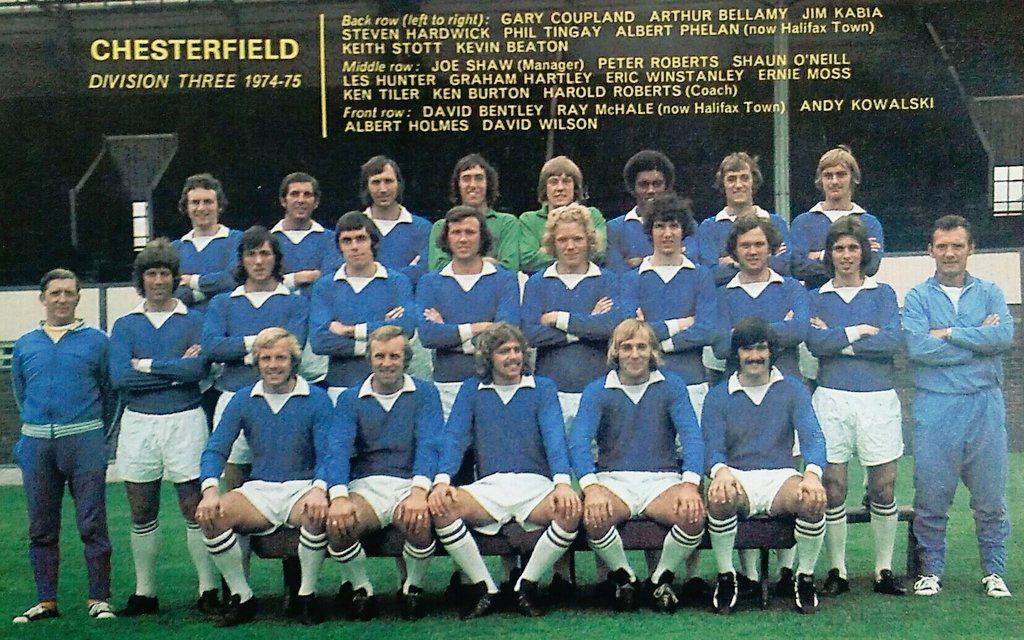
Albert Holmes front row, second from right
Albert’s career spanned a total of 16 years, appearing 486 times for his beloved club. In football, as in life, all good things come to an end and Albert’s experience was no different. He was released in 1974 with manager Jimmy McGuigan exiting days later to take over at Rotherham United.
Scunthorpe United, managed by Ron Ashman, showed an interest in Holmes, wanting to recruit him to the Old Show Ground. Both parties agreed terms before Holmes left for a family holiday. To his delight on his return, Ashman had taken over the manager’s role at Grimsby Town enabling Holmes to return to Saltergate signing forms for new manager Joe Shaw.
The curtain finally came down on his career as he came on as a substitute in February 1976 in a 2-0 defeat at Millwall. For Albert’s loyalty, he was awarded a testimonial in 1976 but declined the offer as he thought the fans had paid enough money over the years to watch him play. That summed up the incredible modesty of the man. To this very day, Albert is the man sitting fourth in the club’s all-time appearance list.
When he finally left Chesterfield, he signed for Boston United, playing for a manager by the name of Howard Wilkinson. Howard was a Sheffield lad but knew Albert personally hence the connection. Holmes was there on a part-time basis, but there was a lot of travelling from Sheffield where he still lived commuting eighty-six miles to Boston. In the 1976/77 season, he made sixteen starts and two substitute appearances failing to the find the net at Shodfriars Lane.
Reflecting on his career in football he said contentedly; “I’ve had a great life and would do it all again. I probably underestimated myself at football and should have spoken out a bit asking for more money.”
“I had some lovely times there and am very grateful for what I had out of the club. It stood me in good stead being there. I met some great fellas and played with some good players.”
After retiring from the game, he went back to his trade with the gas board as a domestic gas fitter installing gas cookers and fires etc.
“When I returned after football, things had changed because electrical appliances had been invented. I then went to the industrial side and, with Sheffield being an industrial city, I was able to go and work on industrial heating, big gas boilers and furnaces all around Sheffield which I enjoyed.”
“I was employed here for a number of years until I was made redundant. Me and a friend who worked in the same line of business ended up working for ourselves, and we ended up sub-contracting to the gas board because they wanted us to fit the big industrial gas meters. I saw out that job for three or four years and that was it for me.”
Paul Holmes
Albert and his wife became proud parents bringing their son, Paul, into the world in February 1968. Paul Holmes followed in his father’s footsteps of making a career in football, interestingly, also as a right back. Like his father, Paul had a great ability to run, being blessed with pace. Albert knew Arthur Bellamy, a former player at Burnley who recommended Paul for a trial at Turf Moor.
Dave Blakeley, a former team mate of Albert, was scouting for Yorkshire side Doncaster Rovers who were managed by the former Leeds United captain Billy Bremner. Bremner was keen to take the youngster on to asses him before making any decisions. At the start of the 1984/85 season, Bremner’s Rovers went on a pre-season tour of Scotland featuring in two games. On 31 July, Motherwell beat Rovers by a single goal without reply, and Paul was selected for their second game two days later – a goalless draw against Stirling Albion.
Bremner decided to sign Paul but he failed to feature in the first team that season. He was, however, a regular in the reserves and youth team. One highlight was when Doncaster Rovers beat fellow Yorkshire side Huddersfield Town in what was called the Intermediate League Cup 5-2 on aggregate with Paul notching a goal in the second leg.
His father Albert said: “I never gave Paul any tips about football. When he was at his first club Doncaster Rovers, I used to take him and another lad called Brian Deane who later went to Sheffield United and Leeds United.”
His first team debut came the following season (1985/86) on 5 November at Belle Vue which was Doncaster’s stadium at the time with Wigan Athletic providing the opposition. The contest ended all square with a 2-2 draw. Paul’s heritage number is 616. (A heritage number applies to every player that appears in a competitive game for the club who is allocated a unique heritage number which identifies them permanently as someone that has represented the club).
That same season Paul appeared six times for the locals but will be remembered for a spectacular goal against York City on 31 March 1986. If the technology had been around at that time, I am told it would have been a contender for goal of the month or even the season. The goal was described as Paul being in a wide position, just inside the visitors’ half, smashing a powerful shot which beat keeper Andy Leaning in the York goal without a hope of saving it. Sadly, he never found the net again for Rovers in the Football League. The following season (1986/87), he made 17 appearances and in his final season in 1987/88 he appeared 29 times, scoring his second goal for Rovers in an FA Cup tie against Rotherham United. Paul’s overall record for Rovers was 52 appearances and two goals. He was probably unfortunate to be released, but Rovers had finished at the bottom of the Third Division leaving manager Dave Mackay no option but to clear the decks and let a number of players go.
Holmes found a new club in Torquay United who were managed by Cyril Knowles who had tasted success as a player himself at Tottenham Hotspur. Torquay United had just lost in the old Fourth Division Play-Off Final (5-3 over two legs to Swansea City) in the summer of 1988 when manager Cyril Knowles, who had used a 5-3-2 formation, wanted a new right wing-back to replace the ageing Jim McNichol. (As an aside, McNichol was the player who had been bitten by Bryn the police dog in the last match of the 1986/87 season, famously creating the stoppage-time in which Torquay had equalised (2-2) against Crewe and avoided relegation, sending Lincoln City down on goal-difference. McNichol was an effective and very popular player, who had scored 11 goals in the 1987-88 season, so his replacement had to be a good one).
Knowles went to Yorkshire to sign Holmes from Doncaster Rovers for £6,000, with the Gulls fans taking to him immediately. Paul was an ideal replacement – sharp, much quicker and more suitable for the wing-back role. What Knowles did not know was that Holmes’ best friend at Doncaster, fellow Yorkshireman Sean Joyce, had left Rovers in the summer and didn’t have a club. Holmes persuaded midfielder Joyce to join him in Torquay, where they shared digs for a while. Joyce asked Knowles for a trial, which eventually earned a contract offer, and the pair of them joined Torquay – Joyce going on to play nearly 200 games over the next five years. Holmes was a regular in the side over the next four seasons and, although he did not play in the 1989 Sherpa Van Trophy Final at Wembley – Torquay being the first South West club to play there – Knowles’ reign had lasted until the last day of September in 1989 to be then succeeded by Dundee-born Dave Smith. The Gulls finished in 15th position at the end of that season.
The season of 1990/91 showed promising signs as Smith wasted no time guiding the Gulls to a high league position but, sadly, form dipped which raised concern for Chairman Mike Bateson who decided to part with Smith hoping to find someone who could revive the season. He found a replacement in John Impey who was appointed four days later.
Impey certainly instilled some creditability at Plainmoor, pushing the Gulls into a play-off place. They eventually qualified for the play-offs where they faced Burnley in a two-legged semi-final. Success over the two legs meant that the newly appointed Impey had taken Torquay to their second Wembley final in two years where they faced Blackpool who stood in their way of promotion to Division Three.
On a very warm evening between the twin towers, the two seaside teams prepared for battle with experienced match official George Courtney taking charge. Torquay led at the break 2-1 and held on until 14 minutes from time when an unfortunate own goal from Chris Curran forced the game into extra time with the score deadlocked at 2-2. Both sides missed their opening penalties in the shoot-out. From then on, both sides held their nerve finding the net as the shoot-out became more tense. Paul Holmes converted the Gulls’ fourth penalty which proved vital when the 9th penalty taken by Blackpool’s Dave Bamber’s effort went agonisingly wide which saw Torquay through 5-4 on penalties. It was the first time that any Wembley final had been decided on penalties. That moment was probably the biggest in his career for Paul Holmes.

(Photo by David Davies/Offside via Getty Images)
After Torquay had been relegated the following season (1991/92), Holmes, who had played 176 league and cup games, was sold to Birmingham City for £40,000 – the next step on a journey to Everton and WBA that would take him to the new Premier League. United also sold centre-half Matt Elliott to Scunthorpe for £60,000 that summer, and he would go on to play for Oxford Unted, Leicester and gain 18 international caps with Scotland.
Speaking in September 2017 Paul said:
“I was at Birmingham City and, if I remember rightly, the club had been taken over with Karen Brady and the Sullivans who had put an investment into the club. Birmingham City’s manager Terry Cooper had also bought Scott Hiley who was also a right back from Exeter City. One Saturday, I turned up for a game and was told that I wouldn’t be playing and Scott would. Terry told me that I would be playing left back when he got things sorted.”
Paul’s time at St Andrews was far from memorable. The club failed to make any progress in any competition, exiting prematurely from both League and FA Cup competitions at the first hurdle. They also participated in the Anglo Italian Cup, a competition that was a substitute for what had been the Full Members Cup. The Blues’ lack of real interest in this unimaginative competition was shared by many of the competitors.
Holmes just got into double figures before his next challenge, which he didn’t expect. As he put it himself:

“I played for Birmingham reserves the following midweek and was told later to go into the office where Terry Cooper had informed me that Howard Kendall from Everton had been on the phone. I thought that this was some kind of joke. I spoke to Howard on the phone who invited me up to play in a reserve game which is basically it. The move was a bit nerve-racking as the players there were all household names. Everton is a massive and fantastic club and was a big step.”
The Everton team had been due to play on a Sunday and, with Kendall looking to fill his time rather than stay in the hotel, he went out to watch Birmingham City play Oxford United always aware that he might just find someone – and on this occasion, he did.
“The only time that I ever saw Howard Kendall until we met was on TV. He of course was a club legend and still is despite his passing. I went to Everton; they liked me and the signing came shortly after. I didn’t need to be asked twice. Whatever wages they offered me I would have signed. It was just great to be involved with a club like that.”
Given the number 34 squad number, Holmes made a home debut for the Toffees on a Wednesday night 24 March, as the Blues beat Ipswich Town authoritatively 3-0. He added three more senior appearances for the remainder of that season with Everton settling for 13th place at the end of the campaign. During the following three seasons, he made 22 appearances and two as substitute.

Paul Holmes, centre row, fourth from left

Paul Holmes, back row, second from left
(Manager Mike Walker was dismissed on 8 November 1994)
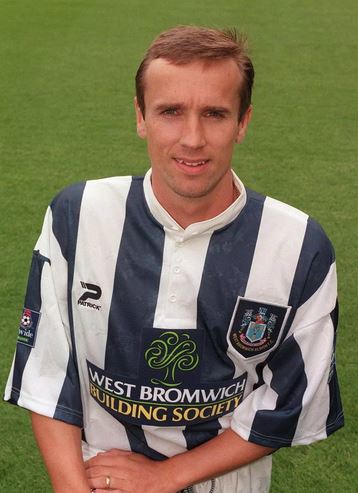
A move to the midlands – West Brom
Paul’s appearances at Goodison were not plentiful, which led to another move, albeit a month’s loan deal on the 12 January 1996 into the Black Country. He moved to the Hawthorns where the Baggies were struggling in 21st position in the First Division having lost their last 11 games (a club record run of defeats). The Albion were level on 24 points with strugglers Wolves and Watford.

The following day on Saturday 13 January, Paul made his Baggies debut against Wolves at the Hawthorns. In a tense derby, the game finished 0-0. The Albion stopped the rot, but could have won the game. Andy Hunt missed a penalty in the last minute! Holmes played on the right-hand side of midfield, but subsequently became a right back (although he could also play at centre back). Albion made the move permanent, signing Paul for £80,000 on 8 February, which was the highest the club had ever paid for a defender at that time.
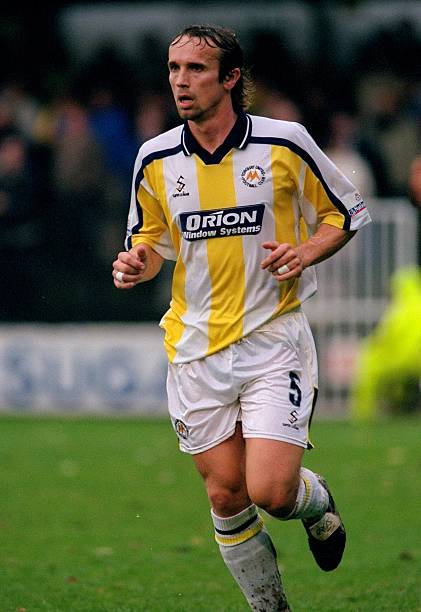
The next two games were also lost but following a 3-1 home win over Southend on 10 February, the Albion went on an incredible run of games which saw just two defeats in eighteen matches, with Paul missing just four of these games. Holmes was a steady performer for the Albion at a time when they were a midtable side. His only goal for Albion came at Swindon on the 30 October 1996, a spectacular right wing cross shot which he reckoned was the best goal of his career. He made 115 first team appearances (one goal) and played in over 30 reserve team games whilst at the Hawthorns, with his last game coming in a 5-1 home defeat to Crewe Alexandra on Easter Monday 1999. This was an infamous game at the Albion because their centre-forward, Fabian De Freitas, failed to turn up for the game thinking it was an evening kick off! Paul left the Albion in November 1999 returning to one of his former clubs, Torquay United, on a free transfer.
A return to Torquay and retirement
In his second spell at Plainmoor Paul made another 95 appearances, bringing his Torquay tally to 271, before retiring in 2003. He has remained in South Devon, working in various roles for the local NHS, and lives in Newton Abbot. He and Joyce are as good friends now as ever – Joyce also stayed in Torbay, going into the roofing business, and he is the long-standing and popular manager of Western League club Bideford
Postscript
Since the publication of this article, we learned the distressing news that Paul Holmes was diagnosed with terminal cancer in the summer of 2023 and passed away aged just 56, at Rowcroft Hospice in Torquay on 7 May 2024. Former teammate Ian Snodin spoke glowingly of Paul, and Everton FC released a statement which read: ‘The thoughts of everyone associated with Everton are with Paul’s wife Kate and all his family.’ Poignantly, one of the pallbearers at his funeral, held on 24 May 2024 at Torbay Crematorium, wore Paul’s 1993/94 number 12 Everton home jersey.
Rest in Peace
Acknowledgements to:
Derbyshire Times
John Coyle, DRFC
John Homer, WBA
David Thomas, chief sports writer, Torquay Herald Express
John Blackwell, Boston United
Patrick Wills
Many thanks to Fran Hickey of EFCHS for proofing and editing

